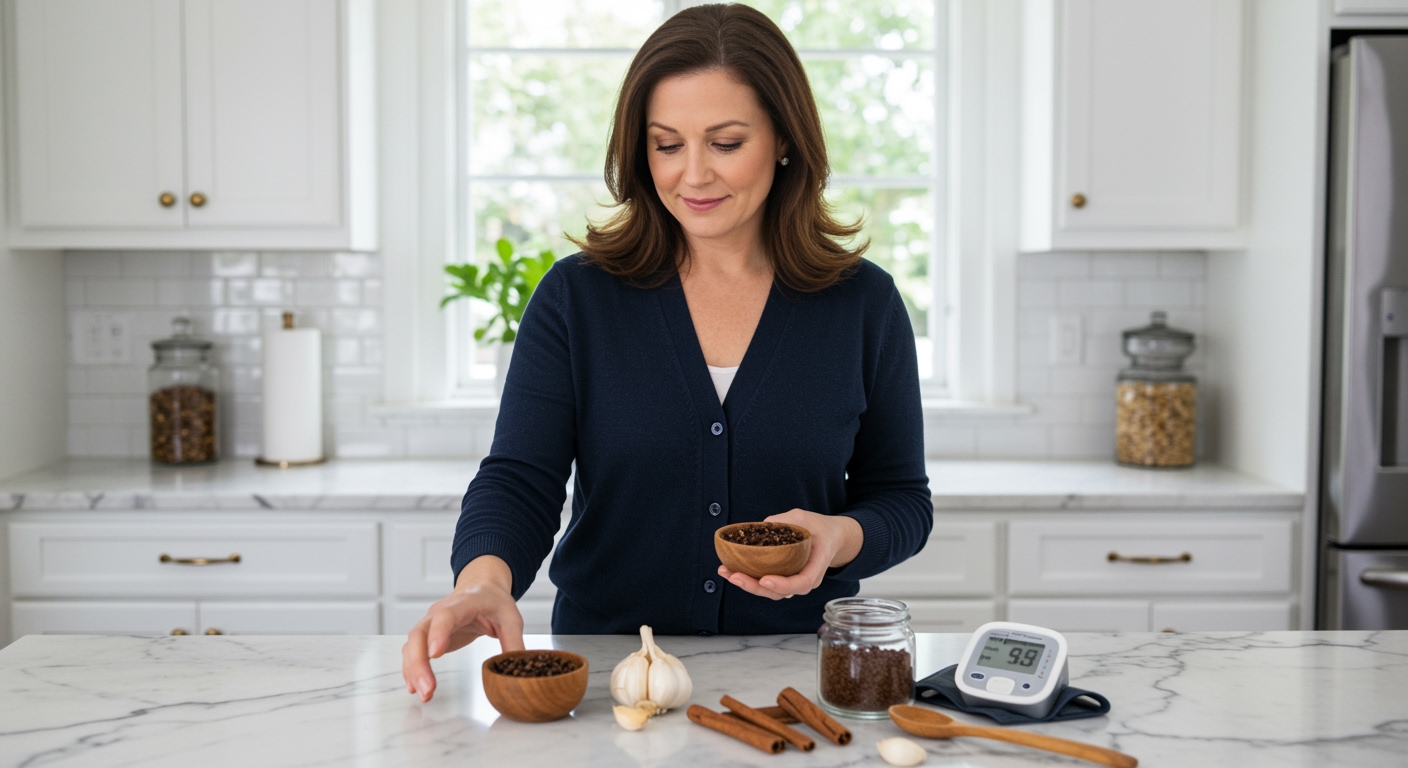✪ Key Takeaway: Cloves contain eugenol and other compounds that may help relax blood vessels and support healthy blood pressure levels.
Introduction
Your grandmother probably used cloves in her holiday cooking without knowing she was adding a potential blood pressure ally to the family feast.
You might be wondering about cloves and blood pressure because you have heard whispers about natural remedies that could support your heart health journey.
Hi, I am Abdur, your nutrition coach and today I am going to explain how cloves might help manage blood pressure levels and what the science really says about this aromatic spice.
What Makes Cloves Special for Blood Pressure?
Cloves contain a powerful compound called eugenol that makes up about 85% of clove essential oil.
This compound acts as a natural vasodilator, which means it helps relax the smooth muscles in your blood vessel walls.
When your blood vessels relax, they become wider and allow blood to flow more easily through them.
Think of it like opening a garden hose that was partially kinked – the water flows more smoothly when the obstruction is removed.
Research shows that eugenol can block calcium channels in blood vessel walls, preventing excessive muscle contraction.
Cloves also contain antioxidants like phenolic compounds that help protect your cardiovascular system from oxidative stress and inflammation.
✪ Fact: One teaspoon of ground cloves contains more antioxidants than half a cup of blueberries.
How Do Cloves Actually Work in Your Body?
When you consume cloves, the eugenol gets absorbed into your bloodstream through your digestive system.
This compound then travels to your blood vessels where it interacts with specific receptors on the smooth muscle cells.
The eugenol blocks calcium from entering these muscle cells, which prevents them from contracting too tightly.
Your heart does not have to work as hard to pump blood through relaxed vessels, which can help lower your blood pressure readings.
Cloves also contain compounds that may help your body produce more nitric oxide, a natural substance that signals blood vessels to relax.
The anti-inflammatory properties of cloves can help reduce chronic inflammation in your blood vessels, which is often linked to high blood pressure.
✪ Pro Tip: The effects of cloves on blood pressure are gradual and work best as part of an overall healthy lifestyle.
What Does the Research Say About Cloves and Blood Pressure?
Several studies have examined the relationship between cloves and cardiovascular health with promising results.
Animal studies show that eugenol from cloves can significantly reduce both systolic and diastolic blood pressure readings.
One study found that eugenol reduced blood pressure by blocking calcium channels and increasing nitric oxide production in blood vessels.
Human studies are more limited, but preliminary research suggests that regular consumption of clove-containing foods may support healthy blood pressure levels.
The antioxidant capacity of cloves has been measured as one of the highest among common spices, which supports their potential cardiovascular benefits.
However, most research has been conducted in laboratory settings or with animals, so we need more human clinical trials to fully understand the effects.
✪ Note: Current research is promising but more human studies are needed to confirm optimal dosages and long-term effects.
How Should You Use Cloves for Blood Pressure Support?
The safest approach is to incorporate whole cloves or ground cloves into your regular cooking routine.
You can add a pinch of ground cloves to your morning oatmeal, coffee, or tea for a daily dose of beneficial compounds.
Cloves work wonderfully in both sweet and savory dishes, from apple pie to curry recipes.
A typical culinary dose would be about 1/4 to 1/2 teaspoon of ground cloves per day, which provides beneficial compounds without overwhelming your taste buds.
You can also make clove tea by steeping 3-4 whole cloves in hot water for 5-10 minutes.
Avoid taking large amounts of clove oil or concentrated extracts without medical supervision, as these can be too potent and may cause side effects.
✪ Pro Tip: Start with small amounts and gradually increase to assess your tolerance and avoid digestive upset.
Are There Any Risks or Side Effects to Consider?
Cloves are generally safe when used in normal culinary amounts, but there are some important considerations.
Large doses of cloves or clove oil can cause stomach irritation, nausea, or digestive upset in sensitive individuals.
Eugenol can interact with certain medications, particularly blood thinners like warfarin, potentially increasing bleeding risk.
If you are already taking blood pressure medications, adding cloves to your routine could potentially enhance their effects.
This interaction might cause your blood pressure to drop too low, leading to dizziness or hypotension.
People with liver conditions should be cautious with large amounts of eugenol, as it can affect liver function in high doses.
Always consult with your healthcare provider before using cloves medicinally, especially if you have existing health conditions or take prescription medications.
✪ Note: Monitor your blood pressure regularly when adding any new natural remedy to your routine.
The Bottom Line
Cloves show genuine promise as a natural support for healthy blood pressure levels through their eugenol content and antioxidant properties.
The best medicine is often hiding in your spice cabinet, waiting to be discovered through mindful daily choices.
I would love to hear about your experiences with cloves or any questions you might have about natural approaches to blood pressure management – please share your thoughts in the comments below.
References
At NutritionCrown, we use quality and credible sources to ensure our content is accurate and trustworthy. Below are the sources referenced in creating this article:
- Journal of Food and Dairy Sciences: Cloves and Blood Pressure Research
- PMC National Center for Biotechnology Information: Eugenol and Cardiovascular Effects
- Global Essential Oil: Correlation Among Cloves and Blood Pressure
- RESPeRATE: Health Benefits of Adding Cloves to Your Diet





